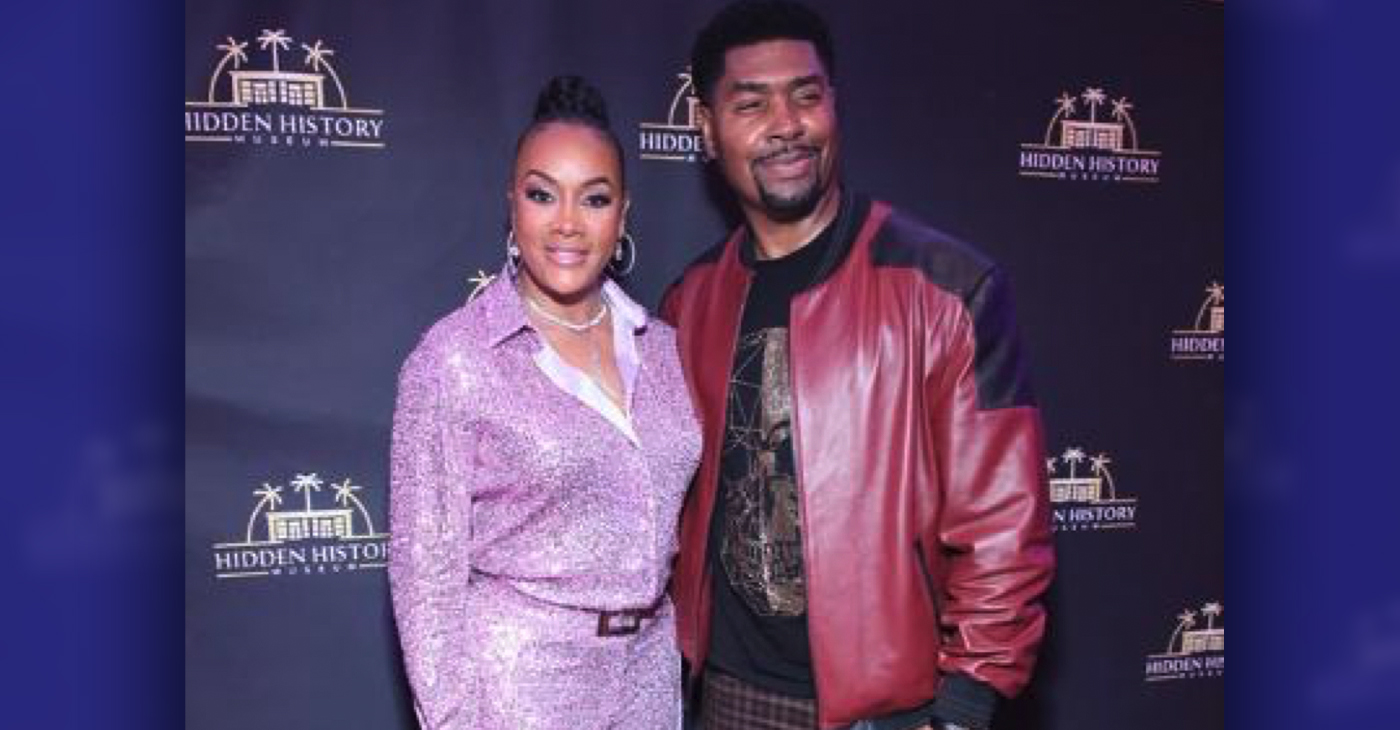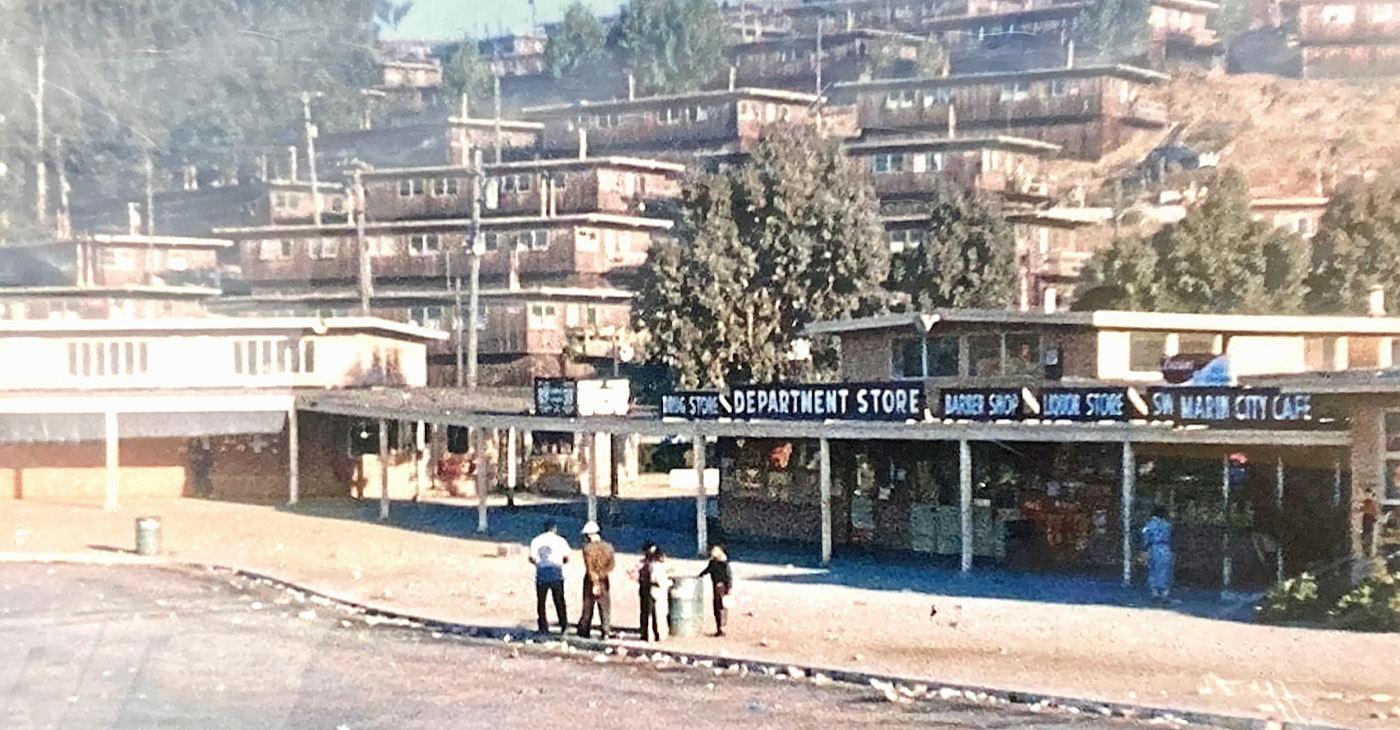Black History
Hidden History Black Museum Opens in Los Angeles
Various actors and celebrities such as Vivica A. Fox, and hundreds of other people, were on hand to celebrate the last weekend of Black History Month. Founded by Tariq Nasheed, an award-winning documentary film producer and New York Times best-selling author, the Hidden History Museum highlights current and past historical Black figures from freedom fighters, to inventors, master teachers, to founding pioneers in Black California, as well as Hip-Hop culture on the West Coast.

By Lee Hubbard
While the rain stormed down all day in the Jefferson Park area of Los Angeles, it could not damper the excitement of the grand opening of the Hidden History Museum of Black culture, this past weekend.
Various actors and celebrities such as Vivica A. Fox, and hundreds of other people, were on hand to celebrate the last weekend of Black History Month. Founded by Tariq Nasheed, an award-winning documentary film producer and New York Times best-selling author, the Hidden History Museum highlights current and past historical Black figures from freedom fighters, to inventors, master teachers, to founding pioneers in Black California, as well as Hip-Hop culture on the West Coast.
One example of this is an exhibit that looks at the naming of the state California, which was named after Califa, a queen who was a Black Moor. The Spanish writer Garci Rodriguez wrote the novel in 1500, and although Califa was a fictional character, when Juan Rodriguez Cabrillo, founded it in 1542, he named the area after the character in the novel.
“Stories like this are featured in the museum and it’s needed,” said Utopia Hammond, a San Francisco resident, who came to the grand opening. “People need to know our Black history and this museum features things and people that aren’t normally talked about and or featured in other museums.”
“I decided to start this museum after I was driving down Crenshaw Boulevard and saw that people were using the site where Nipsey Hussle got shot and killed as a tourist attraction,” said Nasheed. “On any given day, you can see crowds of people taking pictures in front of the mural that has Nipsey’s face on it.”
Hussle was a popular and emerging rap artist who was just coming into national acclaim when he was shot down in front of his clothing store March 31, 2019. The makeshift Nipsey Hussle memorial and daily scene behind it pushed Nasheed to create a place where people can see positive affirmations of black culture and tell the stories of black history that aren’t told.
“We need to create institutions that we as Black people and or Black groups own and control the narrative,” said Nasheed.
People came from all over the country for the grand opening. They also got to watch the premiere of Nasheed’s new documentary film, “American Maroon,” which looks at the Black people who maintained hidden communities while fighting with slave-owning colonizers pre- Civil War.
Nasheed spent just under $2 million to build the Hidden History Museum. Half of the money was raised in a month by a Black grassroots crowdfunding effort Nasheed started using his YouTube channel Tariq Radio, and other social media platforms. This, along with some of his personal funds were used to buy the building that houses the museum.
“The Black grassroots supported my vision and this effort,” said Nasheed. “We wanted to have the museum over in Leimert Park, a black district in LA, but when we tried to buy property there were several roadblocks, before we got to Jefferson Park.”
The Hidden History Museum is located at 2131 W Jefferson Blvd. in Los Angeles Ca. For more information, go to www.hiddenhistorymuseum.com
Activism
Oakland Post: Week of April 17 – 23, 2024
The printed Weekly Edition of the Oakland Post: Week of April 17 – 23, 2024

To enlarge your view of this issue, use the slider, magnifying glass icon or full page icon in the lower right corner of the browser window. ![]()
Black History
Matthew Henson: Explorer Extraordinaire
Matthew Henson, a trailblazing explorer who overcame countless obstacles to leave an incredible mark on history. Born on August 8, 1866, in Charles County, Maryland, his journey is a testament to the power of determination and the spirit of adventure.

By Tamara Shiloh
Matthew Henson, a trailblazing explorer who overcame countless obstacles to leave an incredible mark on history. Born on August 8, 1866, in Charles County, Maryland, his journey is a testament to the power of determination and the spirit of adventure.
Henson’s life began amidst the backdrop of post-Civil War America, where opportunities for African Americans were scarce. From a young age, he possessed an insatiable curiosity about the world beyond his small town. At the age of 12, he embarked on a journey that would change the course of his life forever when he joined a merchant ship as a cabin boy.
His most famous expedition was his journey to the Arctic with renowned explorer Robert E. Peary. In 1887, Henson joined Peary’s crew as a seaman and quickly proved himself to be invaluable with his skills as a navigator and craftsman. Over the course of several expeditions, Matthew endured extreme cold, treacherous terrain, and grueling conditions as he and Peary sought to reach the elusive North Pole.
In 1908–09, Peary set out on his eighth attempt to reach the North Pole. It was a big expedition, with Peary planning to leave supplies along the way. When he and Henson boarded their ship, the Roosevelt, leaving Greenland on August 18, 1909, they were joined by a large group. This included 22 Inuit men, 17 Inuit women, 10 children, 246 dogs, 70 tons of whale meat, blubber from 50 walruses, hunting gear, and tons of coal.
In February, Henson and Peary left their anchored ship at Ellesmere Island’s Cape Sheridan, along with the Inuit men and 130 dogs. They worked together to set up a trail and supplies along the way to the Pole.
Peary picked Henson and four Inuit people to join him in the final push to the Pole. However, before they reached their destination, Peary couldn’t walk anymore and had to ride in a dog sled. He sent Henson ahead to scout the way. In a later interview with a newspaper, Henson recalled being in the lead and realizing they had gone too far. The group turned back, and Henson noticed his footprints helped guide them to their destination. At that location, Henson planted the American flag.
Henson’s legacy extends far beyond his expeditions to the Arctic. He shattered racial barriers in the world of exploration and inspired countless individuals, regardless of race, to dream big and pursue their passions. In 1937, he was finally recognized for his achievements when he was inducted into The Explorers Club, an organization dedicated to promoting scientific exploration and field research.
Matthew Henson died in the Bronx, New York, on March 9, 1955, at the age of 88.
Art
Marin County: A Snapshot of California’s Black History Is on Display
The Marin County Office of Education, located at 1111 Las Gallinas Ave in San Rafael, will host the extraordinary exhibit, “The Legacy of Marin City: A California Black History Story (1942-1960),” from Feb. 1 to May 31, 2024. The interactive, historical, and immersive exhibit featuring memorabilia from Black shipyard workers who migrated from the South to the West Coast to work at the Marinship shipyard will provide an enriching experience for students and school staff. Community organizations will also be invited to tour the exhibit.

By Post Staff
The Marin County Office of Education, located at 1111 Las Gallinas Ave in San Rafael, will host the extraordinary exhibit, “The Legacy of Marin City: A California Black History Story (1942-1960),” from Feb. 1 to May 31, 2024.
The interactive, historical, and immersive exhibit featuring memorabilia from Black shipyard workers who migrated from the South to the West Coast to work at the Marinship shipyard will provide an enriching experience for students and school staff. Community organizations will also be invited to tour the exhibit.
All will have the opportunity to visit and be guided by its curator Felecia Gaston.
The exhibit will include photographs, articles and artifacts about the Black experience in Marin City from 1942 to 1960 from the Felecia Gaston Collection, the Anne T. Kent California Room Collection, The Ruth Marion and Pirkle Jones Collection, The Bancroft Library, and the Daniel Ruark Collection.
It also features contemporary original artwork by Chuck D of the Rock and Roll Hall of Fame group Public Enemy, clay sculptures by San Francisco-based artist Kaytea Petro, and art pieces made by Marin City youth in collaboration with Lynn Sondag, Associate Professor of Art at Dominican University of California.
The exhibit explores how Marin City residents endured housing inequities over the years and captures the history of plans to remove Black residents from the area after World War II. Throughout, it embodies the spirit of survival and endurance that emboldened the people who made Marin City home.
Felecia Gaston is the author of the commemorative book, ‘A Brand New Start…This is Home: The Story of World War II Marinship and the Legacy of Marin City.’ Thanks to the generous contribution of benefactors, a set of Felecia’s book will be placed in every public elementary, middle, and high school library in Marin.
In addition, educators and librarians at each school will have the opportunity to engage with Felecia in a review of best practices for utilizing the valuable primary sources within the book.
“Our goal is to provide students with the opportunity to learn from these significant and historical contributions to Marin County, California, and the United States,” said John Carroll, Marin County Superintendent of Schools.
“By engaging with Felecia’s book and then visiting the exhibit, students will be able to further connect their knowledge and gain a deeper understanding of this significant historical period,” Carroll continued.
Felecia Gaston adds, “The Marin County Office of Education’s decision to bring the Marin City Historical Traveling Exhibit and publication, ‘A Brand New Start…This is Home’ to young students is intentional and plays a substantial role in the educational world. It is imperative that our community knows the contributions of Marin City Black residents to Marin County. Our youth are best placed to lead this transformation.”
The Marin County Office of Education will host an Open House Reception of the exhibit’s debut on Feb. 1 from 4 p.m. – 6 p.m.. All school staff, educators, librarians, and community members are encouraged to attend to preview the exhibit and connect with Felecia Gaston. To contact Gaston, email MarinCityLegacy@marinschools.org
-

 Activism4 weeks ago
Activism4 weeks agoOakland Post: Week of March 20 – 26, 2024
-

 #NNPA BlackPress3 weeks ago
#NNPA BlackPress3 weeks agoCOMMENTARY: D.C. Crime Bill Fails to Address Root Causes of Violence and Incarceration
-

 #NNPA BlackPress3 weeks ago
#NNPA BlackPress3 weeks agoMayor, City Council President React to May 31 Closing of Birmingham-Southern College
-

 #NNPA BlackPress3 weeks ago
#NNPA BlackPress3 weeks agoCOMMENTARY: Lady Day and The Lights!
-

 #NNPA BlackPress3 weeks ago
#NNPA BlackPress3 weeks agoFrom Raids to Revelations: The Dark Turn in Sean ‘Diddy’ Combs’ Saga
-

 #NNPA BlackPress3 weeks ago
#NNPA BlackPress3 weeks agoBaltimore Key Bridge Catastrophe: A City’s Heartbreak and a Nation’s Alarm
-

 #NNPA BlackPress3 weeks ago
#NNPA BlackPress3 weeks agoBaltimore’s Key Bridge Struck by Ship, Collapses into Water
-

 Activism3 weeks ago
Activism3 weeks agoOakland Post: Week of March 27 – April 2, 2024
















































